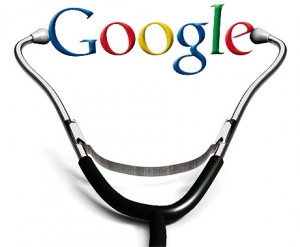healthy bytes: doctor internet

So, you’ve got a headache. And you’re feeling tired. Reluctant to leave your bed, you reach for your laptop and log in. Headache and fatigue, you type into Google. According to SymptomChecker.com, you could have DIABETES, CARBON MONOXIDE POISONING or KIDNEY DISEASE. Sound familiar?
With today’s technology, I bet you’ve diagnosed your aches and pains online at least once. Going to the doctor is boring/embarrassing/expensive, right? And you know your own body better than anyone else, right? Bupa’s recent Health Pulse research found that Australians want to ‘manage their own health’, with 45% of respondents requesting access to a doctor via email and over half requesting to renew prescriptions online. Bupa and most other companies in the health industry have since published their grave warnings that online health information should ‘not be a substitute for seeing a doctor’.
As a serial offender of web diagnosis – and of providing online health advice! – I’m not going to tell you that you shouldn’t research your headache online. However, here is the most common side-effect of web diagnosis, and how best to minimise its occurrence:
You might diagnose yourself incorrectly.
1. Find a reliable health website to make sure you are reading valid information.
My favourite is the Victorian Government’s Better Health Channel , which provides general information about almost anything health. (This includes alternative medicine!) Every article has been written with and approved by the Victorian Department of Health, and the website’s personalised search tool can also advise you where to find health professionals offline.
2. Be aware that the Internet doesn’t know or care who you are as an individual.
Let’s say your chest hurts. The Internet tells you HEART ATTACK. What?! Now, think about it. You’re probably under 30. This diagnosis has not taken into account your age, your medical history or the fact you may have just eaten something without chewing it! Be aware that while the web presents an objective perspective, it also doesn’t know anything about you except the fact that your chest hurts right now. If your fit 20-something-year-old friend told you they had chest pain, you’d probably suggest indigestion. Even without medical expertise, you’d know more about their health than the Internet.
3. Be aware that you are not an expert.
‘When people are able to access a lot of information that isn’t filtered, and they don’t have expertise in the field, they don’t know how to prioritise the information.’ This statement could apply to any situation. (What spring immediately to my mind are religious and feminist debates…) In terms of health, unless you’re an expert you aren’t going to be able to read a slab of medical speak and gauge exactly what’s going on within your own body. An online study might claim that your Pill can cause blood clots, but that doesn’t mean your headache is a blood clot. (Also, if you really did have a blood clot you’d need immediate medical attention anyway.)
Do you ever self-diagnose online? Has it worked for you? Why? Why not?

